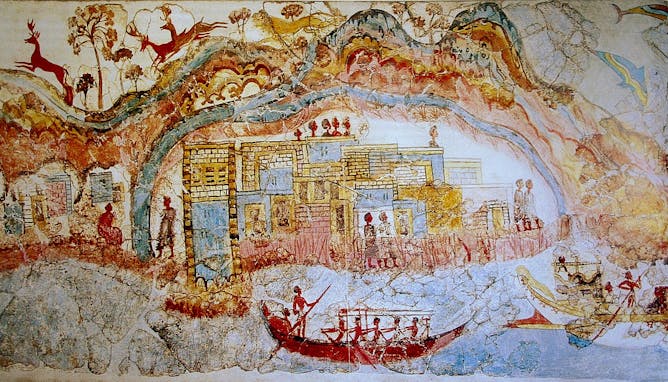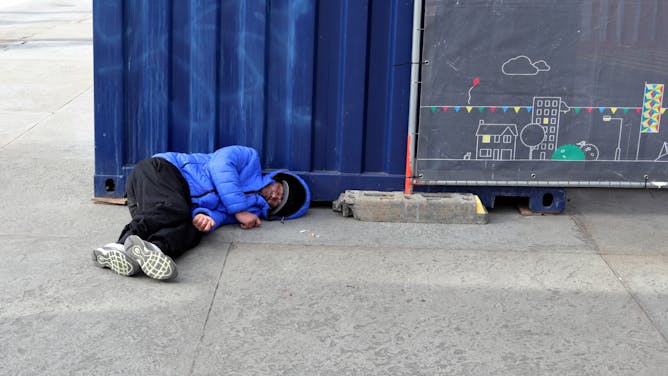|
Settling down in front of the TV with a hungry curiosity and a brand new docuseries to feed it is one of my favourite ways to spend an evening. So the new Netflix show, Ancient Apocalypse – which promises to hunt for evidence of mysterious, lost civilisations dating back to the last ice age – should have been a treat.
But beyond the flashy visuals and dramatic claims is a dangerous disregard for expert research. In fact, for presenter Graham Hancock, the kinds of expert archaeologists I’d usually look forward to learning from – the kind he considers “extremely defensive, arrogant, and patronising” – are actually the enemy. In a full-throated defence, archaeologist Flint Dibble explains what’s at stake when a cultural force as influential as Netflix gives platform to anti-expert thinkers like Hancock.
We learned last week that benefits in the UK are to rise in line with inflation. Here’s why our experts in inequality and austerity say it’s too late. Plus every year, 26,000 children are admitted to hospital with respiratory syncytial virus or RSV. Two experts in paediatric diseases explain why rates of the infection are rapidly on the rise this year, and what is being done globally to combat its spread.
Unlike Graham Hancock, we at The Conversation think experts have a huge contribution to make to public life. If you do too, please consider making a donation of whatever you can to our non-profit operation and help us continue amplifying expert voices.
Donate
|

|
Anna Walker
Senior Arts + Culture Editor
|
|

Wall-painting depicting a procession of ships from the Bronze Age site of Akrotiri, Thera in Greece.
Yann Forget
Flint Dibble, Cardiff University
The new ‘docuseries’ makes grand claims about our ice age ancestors. Here’s why you should proceed with caution.
|

Rising levels of homelessness and rent arrears in council housing show how deeply austerity measures have harmed society.
Devis M | Shutterstock
Anna Barford, University of Cambridge; Mia Gray, University of Cambridge
Cuts to public spending do not actually result in efficiency savings because they cause more problems for people than they solve.
|

RSV is most common in children under two.
Aleksandra Suzi/ Shutterstock
Chrissie Jones, University of Southampton; Saul Faust, University of Southampton
Respiratory syncytial virus may be common, but it can lead to severe infection in some children.
|
Politics + Society
|
-
Alex Balch, University of Liverpool
Leaving the EU has meant leaving a series of agreements on immigration.
-
Christoph Pfeufer, Bocconi University; Massimo Morelli, Bocconi University
The current political polarisation will make the president’s job even harder.
-
Dafydd Townley, University of Portsmouth
Laws making it more difficult to vote are being introduced around the democratic world, an expert says.
-
Martin Smith, University of York; Dave Richards, University of Manchester; Sam Warner, University of Manchester
With an election ahead and finances stretched to capacity, the prime minister has a difficult balancing act to strike.
|
|
Business + Economy
|
-
Alper Kara, University of Huddersfield
Female managers and board members have a positive effect on company performance and the environment.
-
Steve Schifferes, City, University of London
Swingeing cuts especially to infrastructure spending after 2025 give Labour some choices to make.
|
|
Environment
|
-
Matt Telfer, University of Plymouth
Atmospheric dust storms often follow wildfires and have serious impacts on human health and ecology.
-
Laura Thomas-Walters, University of Stirling; Bob Smith, University of Kent; Diogo Veríssimo, University of Oxford; Takahiro Kubo, University of Oxford
Japan was one of the world’s largest ivory markets – research explains why the country is no longer a key destination for the product.
|
|
Health
|
-
Arjune Sen, University of Oxford
People who had COVID were 55% more likely to develop epilepsy or seizures over the next six months than people who had influenza – but the overall risk is still small.
-
Tom Metherell, UCL
Record numbers of young people have faced mental health difficulties during the pandemic. Our research suggests that those without computer access were more likely to be affected.
|
|
Science + Technology
|
-
Benjamin Fernando, University of Oxford
A team of scientists have found a surprising amount of water ice on Mars.
|
|
|
|
| |
|
|
|
|
| |
| |
| |
| |
| |
|
|